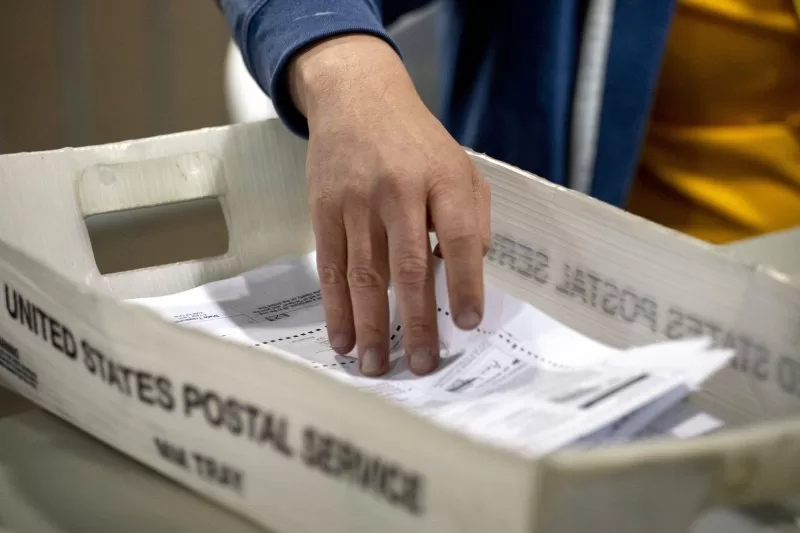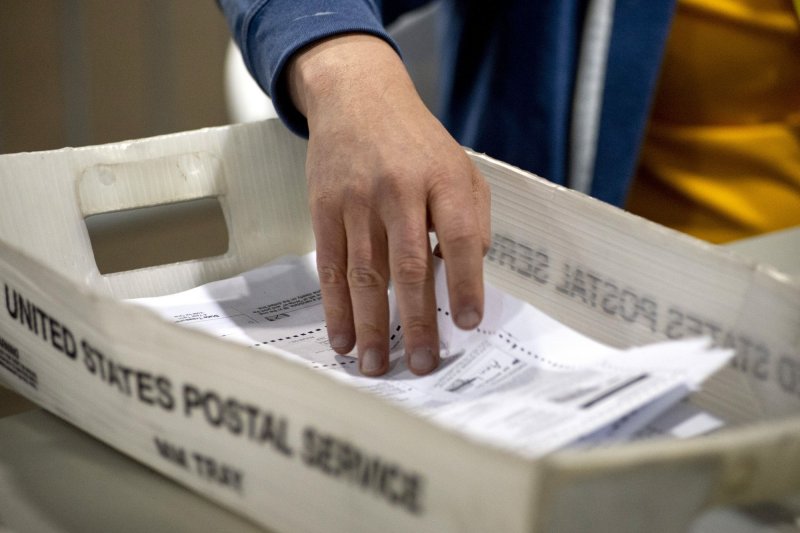Calls for hand-counting ballots in elections exemplify a growing distrust in the election process in the United States. File Photo by Archie Carpenter/UPI |
License PhotoJune 6 (UPI) — Ballot measures in three South Dakota counties failed on Tuesday that would move to counting votes on election night by hand. But the broader calls for such a change demonstrate the enduring effects of conspiracy theories about the 2020 election.
The validity of election results, and more so the transparency around the process, remain in question for some, to the point that big changes have been proposed. Election night hand counts are one proposal that has gained some traction.
A fraction of a percentage of jurisdictions across the country hand count ballots on election night. The jurisdictions that do are generally counties with small populations. Yet the process remains challenging even in those instances.
Barb DeSersa is the auditor of Tripp County, S.D. Her county was one of three to vote down proposals to ban vote tabulating machines and move to hand-counting ballots. Haakon and Gregory County did the same.
DeSersa shared her concerns and experience with hand counting with UPI prior to Tuesday’s results. She said hand counting would require more poll workers to be hired and push vote tallying back hours or more.
Tripp County has a population of 5,624, according to the U.S. Census Bureau.
“I think this comes from [Donald] Trump losing the election. I do believe that’s where it’s stemmed from,” DeSersa said. “They feel like the election was rigged. In South Dakota we have one electoral vote and he went through in South Dakota. I don’t think there’s a problem here.”
Tripp County election workers hand-counted ballots in the 2022 midterms. According to DeSersa, the count was incorrect.
“The last precinct that we did get in that morning at 5:30 was off,” she said. “They knew that when they brought it in. They knew that but they were all exhausted.”
Counties in Arizona, Nevada, Colorado, California and Texas have either recently performed hand counts or plan to do so in 2024. Mike Carter, a Republican candidate for Missouri secretary of state, has proposed it during his campaign. There have also been discussions in Georgia, Ohio and Michigan.
Election conspiracy theories
Jennifer Morrell, CEO and founder of The Elections Group, told UPI the conspiracy theories about voting technology coming out of the 2020 election certainly played a large role in eroding the trust in elections.
“It all kind of goes back to the messaging we saw post-2020 related to conspiracy theories about voting technology,” Morrell said. “Four years of fear-mongering and grifting, repeating those messages.
Mike Lindell, founder of My Pillow and supporter of former President Trump, has been among the biggest individual proponents of hand counting being adopted more widely. He has also lent his platform to conspiracy theories about the election.
Dominion Voting, a voting system technology company, filed a defamation lawsuit against Lindell for furthering disproven claims about their voting machines following the 2020 election.
Dominion settled a defamation lawsuit against Fox News and former host Tucker Carlson after Carlson and other television personalities repeatedly spread disinformation about its voting machines. Fox News agreed to pay $787.5 million in the settlement.
Another election voting system company, Smartmatic, settled a lawsuit in April after suing One America News Network for defamation. The company alleged that OANN made false claims about it despite Smartmatic machines only being used in Los Angeles.
Lindell was also ordered to pay $5 million after hosting a contest challenging people to disprove his election claims. He had refused to pay the winner of the contest, Robert Zeidman, who proved that data Lindell had touted was not related to the election.
Lindell is not alone. Others have followed his lead. The Liberty Lions League has pushed the theory that hackers in Italy — backed by the Vatican — tampered with voting machines in 2020. Mark Cook, the group’s cybersecurity and network consultant, toured 19 states with his “Hand Count Road Show” to share the conspiracy theories and tout hand counting as a solution.
Cook and other members of the group also presented to the Kansas legislature in September. The presentation focused on criticism of voting machines and election officials.
Trump’s former attorney Rudy Giuliani was found liable for defamation last year after spreading false claims about two Georgia election workers. He was ordered to pay $133,000 in sanctions over a civil lawsuit brought forth by Ruby Freeman and Wandrea’ ArShaye Moss.
“We’ve seen tech companies suspend their efforts to curb election misinformation and disinformation on mainstream social media sites,” Morrell said. “When you have voters and constituents seeing those consistently in their feeds it’s really challenging for those trying to counter those messages. It really is this deep-seated mistrust of the government and mistrust of technology.”
‘Human process’
The Elections Group partnered with the States United Democracy Center to craft a report about hand counts and their limitations. They found that full hand counts cost counties and states more, take much longer and are more likely to result in incorrect counts.
There is a place for hand counting, even in larger jurisdictions, according to Pam Smith, president and CEO of Verified Voting — a nonpartisan organization that researches the impact technology has on the administration of elections. That role is often limited to taking a sample of ballots and checking them for accuracy with the tablature machines.
These post-election audits were not as common in 2020 but they have been adopted by most states since. South Dakota is implementing post-election audits for the first time this year, starting with auditing Tuesday’s results in the coming week.
“We’ve worked from the premise all along that there could be problems with the technology but you don’t just rely on it,” Smith said. “You perform checks. If you had a physical ballot that a person can check, that physical ballot can be used to confirm whether the equipment got the count right.”
These checks happen at multiple points throughout the process, including in preparation for an election. Machines are tested to ensure that all of the contests and candidates are correctly included on the ballot and that the systems are operating as they should.
Smith added that even with election night hand counts, technology is still involved.
“It may be even using electronic poll books to check voters in,” Smith said. “You can’t legally abandon all of the technology. A [ballot] scanner is just one more piece of the puzzle.”
Researchers like Smith and Morrell, and election workers like DeSersa continue to face the challenge of instilling trust back in the election process for those who have lost it. Smith and Morrell agree that the best path to mending that trust is through education.
This comes in many forms, including messaging by federal, state and local governments, as well as more personal methods. Some counties have invited the public in to tour their election headquarters, ask questions and get a closer look at how it all works.
By witnessing the chain of custody ballots go through and meeting with election workers, Smith said she has seen people change their minds and ease their concerns.
“Once they did that they were totally onboard,” she said. “It’s about the knowledge. The sooner we get to that, people can know there’s these checks and balances. It’s really important for people to be proactive. They can ask questions, but ask them of the election officials. The more you can participate, the better.”
Smith also encourages concerned voters to volunteer to work the polls. Almost every precinct in the country is struggling to find poll workers, she said. The mistrust in elections has added to that challenge.
Morrell adds that with or without voting machines, the election process is a human process. She echoes Smith in encouraging people to volunteer to work their elections to gain a greater appreciation of the human aspect.
“We put so much focus on the technology but the election is still very much a human process and a community process,” Morrell said. “We do rely on voting systems to do a lot of that heavy lifting. At the end of the day, it’s still a lot of people working side-by-side. People of both parties. Anybody that works an election raises their hand and takes an oath. That means something to them.”

